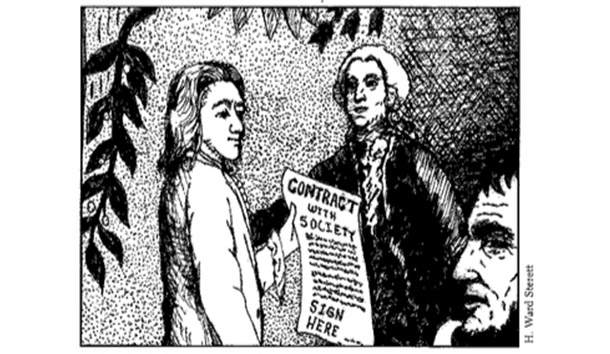John Locke has been interpreted in various ways that appeal I to conservatives—e.g., as a Christian, albeit a materialist and anti-Trinitarian, or as a qualified defender of private property— but there is a general drift to his thought that should offend traditionalists. His view of human beings as thinking matter without the capacity for innate ideas, his unmistakable faith in sexual egalitarianism, and his constructivist theory of civil society are all fundamentally anti-conservative. The point is not whether any of these positions is theoretically defensible but whether conservatives (or historically minded classical liberals) should want to identify themselves as Lockeans. The clear answer is no.
It is simply untrue that those loyal to the foundations of the American polity must be devotees of Locke. While some passages in the Declaration of Independence were adapted from Locke’s Second Treatise, George Carey, Forrest McDonald, and M.E. Bradford have all made two self-evident points: Most of the Declaration consists of a bill of grievances that came out of English parliamentary tradition but not necessarily Locke’s writings; and the founding political document of the American nation was the Constitution, not the Declaration. In any case, as shown exhaustively by McDonald, the Framers, in constructing the federal union, drew on such a multitude of ancient and modern authors that it would be difficult to award Locke pride of place among their sources.
One of the sources for the Constitution was Scottish philosopher David Hume, to whose achievements Donald Livingston has devoted two erudite books. According to Livingston, Hume’s conception of the social good as grounded in custom and tradition was partly a reaction to the fiction of Locke’s social contract. In the “Original Contract” and other essays, Hume expressed astonishment that a serious thinker could believe that individuals left a “state of nature” and entered civil society by way of a contract. Hume wondered how one could build a political theory on a situation that neither he nor his acquaintances had ever encountered. He was also amused by the notion of “natural right,” a concept of entitlement that was supposed to be natural and inborn but which most of the human race knew nothing of If natural right should seem axiomatic, Hume asked, why did individuals throughout the world live “in subordination to each other” without a sense of being deprived of rights? Hume was not defending oppression but insisting that subjects of a limited monarchy should note their historical blessings and advantageous customs instead of inventing bogus rights and chimerical states of nature.
But Lockean contractualism has graver flaws than its bizarre anthropology. It is not coincidental that socialist John Rawls and mainstream welfare statists find it appealing. Although Locke treats property as a natural right that civil society might be required to defend, his defense of property per se was rather qualified. As the closing sections of the Second Treatise and the scholarship of Richard Ashcraft indicate, Locke was an embattled advocate of “the People” when it set out to overthrow tyranny and establish popular government. A tension, in fact, exists between Locke’s rights to life, liberty, and property and the majoritarian democracy that he evokes in his political pamphlets. As Ashcraft suggests, this tension can be resolved as easily in the direction of democratic collectivism, based on presumed individual consent, as it can by affirming the inviolability of property.
In the world of possessive individualism conceived by this late 17th-century Whig pamphleteer, the state comes into existence to ensure the individual’s right to material gratification. If the people see fit, the Lockean regime can achieve its purpose as plausibly by redistributing earnings and handing out entitlements as it can by protecting entrepreneurial profit. It can also enforce claims beyond the ones Locke fancied, if the majority comes to consider such claims as natural rights. Why limit rights to the short list Locke drew up when he was trying to dislodge the Stuart monarchs? It makes good Lockean sense to have the modern state guarantee claims that are more relevant today: e.g., a right to self-esteem or protection against insensitive white males, who don’t seem to mind being jerked around by the thought police. There is no Lockean requirement that rulers uphold natural rights in the form in which they existed before the rise of civil society. “Rights” mean what the majority’ takes to be a tolerable understanding of them on the part of those who rule. On this point, the late Willmoore Kendall, on the populist right, and John Rawls and Richard Ashcraft, on the socialist left, have interpreted Locke quite accurately.
Locke’s contributions to political theory can still be read with profit, particularly his strictures on the limits of political covenants. His critical observations concerning Robert Filmer’s defense of divine-right monarchy in the First Treatise on Civil Government make a brilliant polemic, even if Locke often misrepresents his opponent. But Locke’s contractualism is a slippery slope which leads to the political culture that dominates us; the connections between the two are too obvious to be missed. On balance, I agree with the thoughtful counterrevolutionary Joseph de Maistre, who both admired and feared Locke’s imaginative energies: “Le début du discernement c’est le méfi de Jean Locke.“

Leave a Reply